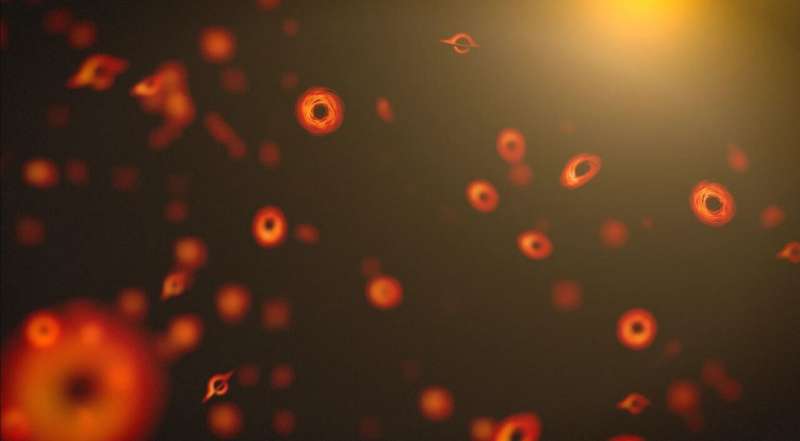
Artist’s rendering of primordial black holes. Credit: NASA Goddard Space Flight Center
Cosmologists have long hypothesized that conditions in the early universe could have caused black holes to form shortly after the Big Bang. These “primordial black holes” have a much wider mass range than the black holes that formed in the later universe after the death of stars, and some of them even condensed to the width of an atom.
No primordial black holes have yet been observed. If they exist, they may explain at least some of the “dark matter” in the universe: matter that doesn’t seem to interact with normal matter electromagnetically, but affects the gravitational dynamics of galaxies and other objects in the universe. It affects .
Now, we may have a new way to detect primordial black holes, albeit in a very limited way.
This method is done through gravitational waves.
First discovered in 2015 by the LIGO Gravitational Wave Observatory, gravitational waves are “ripples” in space-time caused by dramatic events in the universe – often collisions of giant objects such as stellar mass black holes and neutron stars. . About 90 gravitational wave sources have been confirmed by the LIGO-Virgo-KAGRA (LKV) program since 2015.
In an article published this month AAS Research NotesHarvard astrophysicist Avi Loeb investigated whether LKV detectors could pick up signatures of primordial black holes—especially black holes racing close to the speed of light—or other similar objects moving at high speeds.
“All sources of gravitational waves identified so far involve mergers of astrophysical objects with stellar mass, such as black holes or neutron stars, across cosmic distances,” Loeb wrote in a Medium post in August. But these are not the only possible sources.
Imagine a relativistic object traveling near the speed of light at a distance from LIGO that is comparable to the radius of the Earth. At the closest distance, such an object produces a gravitational signal, a signal that strongly depends on its mass and velocity. Loeb says he’s on the move.
With LKV’s current capabilities, the detectors can see any object moving close to the speed of light with a mass of 100 megatons (the mass of a small asteroid a few hundred meters across), but only if it reaches half the diameter of Earth. of detectors
In other words, the LKV detectors would have detected an object of this mass passing by Earth or very close to its surface within a decade of 2015, if it was moving at very high speeds.
Of course, if an asteroid of this mass were to hit Earth at that speed, we would know about it very well from the devastating impact. As such, this capability is of real interest, especially for compact objects such as primordial black holes, with a diameter of an atom or smaller, which may pass close to or even pass Earth regardless.
Such an object has not been seen by the LKV detectors.
Given that this is a very limited detection capability, this is not a surprising result. It doesn’t tell us about objects farther than 6,000 km from Earth’s surface, nor is it capable of detecting slower moving objects.
Future gravitational wave detectors, such as ESA’s LISA detector, which is expected to launch in the next decade, will extend this range, though not by much.
However, when you’re looking for answers to some of the toughest questions in the world, it’s worth looking where you can. This particular stone is not left on it.
More information:
Abraham Loeb, The LIGO-Virgo-KAGRA Constraint on Near-Earth Relativistic Interstellar Objects, AAS Research Notes (2024). DOI: 10.3847/2515-5172/ad73da
Presented by Universe Today
quote: Gravitational-wave observatories could detect primordial black holes speeding through the Solar System (2024, September 2) Retrieved September 3, 2024 from https://phys.org/news/2024-09-gravitational-observatories-primordial-black -holes.html has been restored.
This document is subject to copyright. Except for any fair dealing for the purpose of private study or research, no part may be reproduced without written permission. Content is provided for informational purposes only.
#Gravitational #wave #observatories #detect #primordial #black #holes #speeding #solar #system